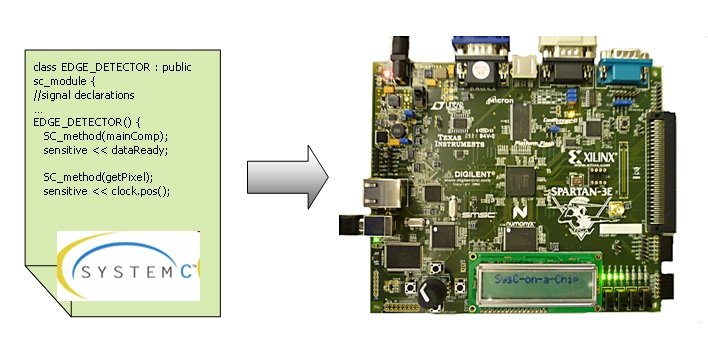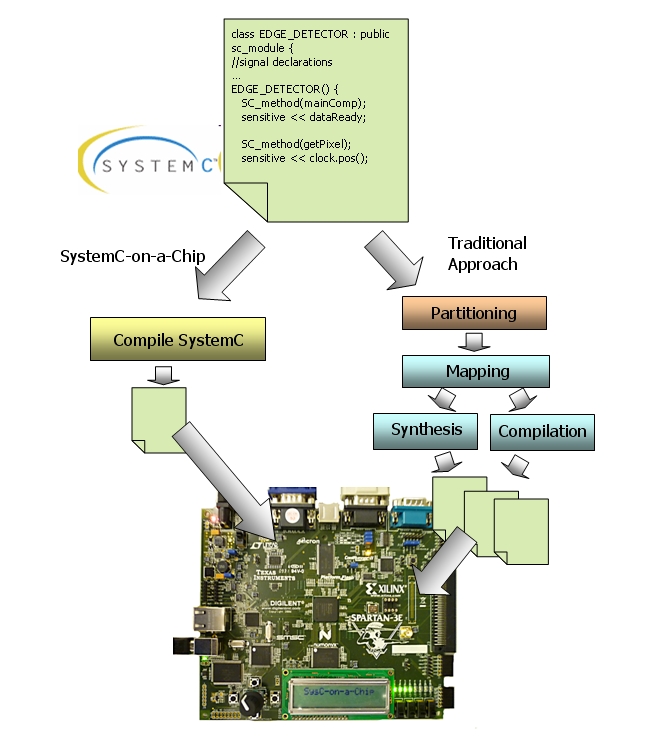
As FPGAs become more common in mainstream general-purpose computing platforms,
capturing and distributing high-performance implementations of applications on
FPGAs will become increasingly important. Even in the presence of C-based synthesis
tools for FPGAs, designers continue to implement applications as circuits, due in
large part to allow for capture of clever spatial, circuit-level implementation
features leading to superior performance and efficiency. We demonstrate the
feasibility of a spatial form of FPGA application capture that offers portability
advantages for FPGA applications unseen with current FPGA binary formats. We
demonstrate the portability of such a distribution by developing a fast on-chip
emulation framework that performs transparent optimizations, allowing spatially-captured
FPGA applications to immediately run on FPGA platforms without costly and hard-to-use
synthesis/mapping tool flows, and sometimes faster than PC-based execution. We
develop several dynamic and transparent optimization techniques, including just-in-time
compilation, bytecode acceleration, and just-in-time synthesis that take advantage of
a platform's available resources, resulting in orders of magnitude performance
improvement over normal emulation techniques and PC-based execution.
SystemC-on-a-Chip is a virtual platform framework that enables a student/designer
to write SystemC applications at the logic, register transfer, behavioral or
structural level, and immediately test that design on any real platform with real
input/output that supports the virtual platform.

In contrast to more traditional system design approaches, the SystemC-on-a-Chip
framework does not rely on costly and difficult-to-use mapping/synthesis tool suites.
Instead, SystemC applications are compiled and interpreted, allowing a designer to
write, compile, and download a design to a real platform in minutes, and with access
to all the real peripherals just as if the designer had actually mapped and synthesized
the design to the platform. The SystemC-on-a-Chip framework thus allows for quick
prototyping and testing on the real platform, complementing the simulation process
on a standard PC and the final implementation on the platform.
 The SystemC-on-a-Chip framework can be useful in beginning digital design,
embedded systems, and parallel computing courses, allowing students to focus
on fundamental and good design/programming practices, and not on the often
complex and difficult-to-use design flows for traditional platform programming
that hinder productivity and cause frustration. Students with a background in C++
development will find SystemC more approachable than traditional hardware description
languages(HDL) like VHDL or Verilog. Similarly, the SystemC-on-a-Chip framewrok
compiles SystemC applications in seconds using a very familiar compilation process
built on top of GCC. The SystemC-on-a-Chip framework can be used in conjunction
with existing software simulation practices to give the user the satisfaction of
seeing a design work on a real platform, and in a much more timely and simpler manner.
The SystemC-on-a-Chip framework can be useful in beginning digital design,
embedded systems, and parallel computing courses, allowing students to focus
on fundamental and good design/programming practices, and not on the often
complex and difficult-to-use design flows for traditional platform programming
that hinder productivity and cause frustration. Students with a background in C++
development will find SystemC more approachable than traditional hardware description
languages(HDL) like VHDL or Verilog. Similarly, the SystemC-on-a-Chip framewrok
compiles SystemC applications in seconds using a very familiar compilation process
built on top of GCC. The SystemC-on-a-Chip framework can be used in conjunction
with existing software simulation practices to give the user the satisfaction of
seeing a design work on a real platform, and in a much more timely and simpler manner.